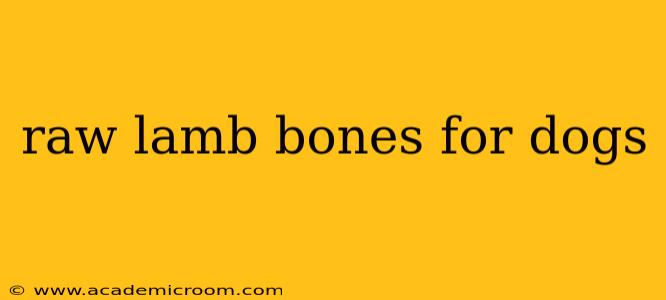Giving your dog raw lamb bones can be a rewarding experience, offering numerous benefits for their dental health, mental stimulation, and overall well-being. However, it's crucial to understand the dos and don'ts to ensure safety and maximize the advantages. This comprehensive guide will delve into the benefits, risks, and best practices for feeding your canine companion raw lamb bones.
Are Raw Lamb Bones Good for Dogs?
Yes, raw lamb bones can be a fantastic addition to a dog's diet when provided correctly. They offer several advantages:
- Dental Health: Chewing on raw bones helps clean teeth, removing plaque and tartar buildup. This natural dental cleaning can reduce the risk of periodontal disease.
- Nutrient-Rich: Bones provide essential minerals like calcium and phosphorus, contributing to strong bones and teeth. Lamb bones, in particular, are often considered to be more digestible than beef bones for some dogs.
- Mental Stimulation: The act of chewing provides mental enrichment, keeping your dog occupied and preventing boredom. This can be particularly beneficial for high-energy breeds.
- Natural Instincts: Many dogs enjoy the natural chewing satisfaction provided by raw bones, fulfilling their primal instincts.
What are the Risks of Giving Raw Lamb Bones to Dogs?
While beneficial, raw lamb bones also present potential risks:
- Choking Hazard: Always supervise your dog while they are chewing on bones. Smaller pieces can be choking hazards, especially for smaller breeds. Choose appropriately sized bones. Avoid splintering bones.
- Dental Damage: While usually beneficial, exceptionally hard bones could potentially cause cracks or chips in your dog's teeth. Monitor for any signs of dental discomfort.
- Digestive Upset: Too many bones, or bones that are too large or difficult to digest, can lead to constipation or gastrointestinal upset.
- Bacterial Contamination: Raw bones can carry bacteria. Ensure the bones are sourced from reputable suppliers and handle them hygienically.
What Type of Raw Lamb Bones are Best for Dogs?
The best type of raw lamb bone for your dog depends on their size, age, and chewing habits. Generally, larger bones are better suited for larger breeds, while smaller bones are appropriate for smaller dogs. Consider these factors:
- Size: The bone should be large enough that your dog can't swallow it whole but small enough that it doesn't cause them discomfort.
- Type: Lamb knuckle bones, marrow bones, and neck bones are popular choices. Avoid giving cooked bones, as they are more brittle and prone to splintering.
- Source: Choose bones from reputable sources that prioritize hygiene and safety.
How Often Should I Give My Dog Raw Lamb Bones?
The frequency of giving raw lamb bones varies depending on your dog's size and breed. Start with small amounts and observe your dog's reaction. Generally, a few times a week is sufficient. Always monitor your dog for any signs of digestive upset or other issues.
Can Puppies Eat Raw Lamb Bones?
Puppies should only be given very small, soft raw lamb bones under strict supervision, if at all. Their teeth and digestive systems are still developing, and larger or harder bones can pose a greater risk.
Are There Alternatives to Raw Lamb Bones?
If you are hesitant about giving raw lamb bones, there are alternatives, such as:
- Rawhide chews: However, these are often processed and may contain additives. Choose natural, additive-free options.
- Dental chews: These are designed to clean teeth but may not provide the same level of enrichment as raw bones.
- Nylabones: These durable chew toys are designed to withstand vigorous chewing.
My Dog Has Eaten a Raw Lamb Bone and is Now Vomiting - What Should I Do?
If your dog is vomiting after consuming a raw lamb bone, monitor them closely. If the vomiting persists or if you notice other symptoms such as lethargy, diarrhea, or difficulty breathing, contact your veterinarian immediately.
Conclusion
Raw lamb bones can be a beneficial addition to your dog's diet, providing dental benefits, mental stimulation, and essential nutrients. However, responsible ownership requires careful selection, supervision, and monitoring for any adverse reactions. Remember to always prioritize your dog's safety and well-being when incorporating raw bones into their diet. Consult your veterinarian if you have any concerns or questions.
